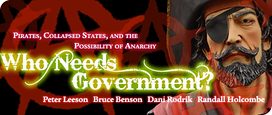Pete says if he could do it today, he’d completely eliminate government in the United States, and that we’d be better off stateless than we are today. Then, in answer to how we get there from here he talks about shrinking the size of government, presumably continuing until it shrinks all the way to nothing.
The path he advocates toward anarchy sounds like Reagan Republicanism to me. So Pete, you might want to elaborate on this. While Reagan didn’t set anarchy as an ultimate goal I don’t see that what you’re advocating is any different in terms of concrete policy than what Reagan advocated. He shrank government as much as he could in his eight years in office, which wasn’t as much as he would have liked. If there’s no way to do better than the conservative Republican strategy, it’s completely unthinkable that we could ever get to anarchy here in the U.S. So, anarchy seems like an abstract “ideal state of the world” that can never be attained, but we can move in that direction by shrinking government. Is that right?
If so, why dress up fiscal conservatism in the garb of anarchy? Economists are used to thinking at the margin. So why not just say: Government is too big, and we want to keep shrinking it as long as the reductions make us better off. If it happens that the end point is anarchy, fine. But both you and Bruce seem to think that anarchy isn’t really attainable in the United States anyway.

